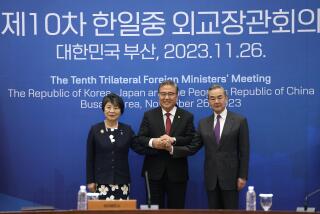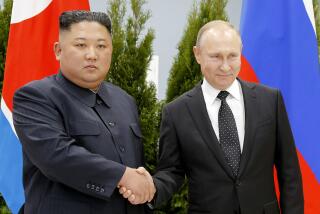Abe’s Visits Signal Neighbors’ Desire to Mend Fences
- Share via
TOKYO — There will probably still be tough questions for new Japanese Prime Minister Shinzo Abe when he travels to China and South Korea for summit meetings this weekend -- questions about his controversial views on Japan’s war guilt, for example, or on how to curb North Korea’s nuclear weapons ambitions.
But Abe has already answered the major question skeptics were asking of a rookie prime minister with a reputation as a hard-line Japanese nationalist: Could he get a meeting with leaders in Beijing and Seoul?
Apparently yes. Launching his time in office with a huge diplomatic gamble, Abe openly sought, and won, invitations to visit China and South Korea. Both countries in recent years had refused to meet Junichiro Koizumi, Abe’s predecessor, ostensibly over his refusal to bend to their demands that he stop visiting Tokyo’s Yasukuni Shrine, which honors war criminals among Japan’s war dead.
The resumption of top-level talks reflects the desire on all sides to get diplomacy back on track amid growing alarm over the region’s deteriorating security situation, notably North Korea’s pledge this week that it would test a nuclear weapon.
Abe will go to Beijing on Sunday, marking the first visit by a Japanese prime minister to China since 2002. In the interim, relations between the two countries have chilled and disputes festered, including a potentially serious conflict over lucrative natural gas deposits in the East China Sea.
Abe, who took office in late September, will travel to Seoul on Monday to meet with President Roh Moo-hyun, who has been a blunt critic of what he describes as Japan’s increasing glorification of its wartime history. Roh previously vowed he would not meet a Japanese leader without receiving the leader’s promise to stay away from Yasukuni.
Abe appears to have sidestepped that demand, at least for now, by refusing to say whether he will visit the shrine. He has visited Yasukuni several times and was a vocal defender of Koizumi’s annual pilgrimages, dismissing Chinese and South Korean complaints as foreign meddling in a strictly Japanese decision over how to mourn the country’s dead.
But envoys from his new government appear to have struck a tacit understanding with the leadership in Beijing and Seoul: Abe won’t go to the shrine. He just won’t declare that he won’t go.
The readiness to embrace this awkward solution underscores the parties’ concern that largely symbolic issues of history are impeding their ability to deal with more pressing security issues. Beijing and Tokyo have also been under pressure to repair political relations because of the deepening economic ties between them.
The fact that Beijing would scramble to play host to Abe on relatively short notice, at the tail end of a weeklong holiday and during an important Communist Party meeting, suggests the importance it attaches to the meeting.
“China has been eager to find ways to break the deadlock, and the new Abe government presents an opportunity at least in the short term,” said Xiaobo Lu, a professor of political science at Barnard College and Columbia University. “Overall it is a positive development. It may signal a beginning of a thaw of the ice-cold relationship.”
The move comes as China, Japan and South Korea are grappling with North Korea’s promise to test a nuclear bomb. For Abe, whose political career was built on aggressive talk against Kim Jong Il’s regime, the response to the threat was instinctive: harsh warnings that a nuclear-armed North Korea would be “impermissible” and threats of more sanctions.
But agreeing on a common approach with China and South Korea, the North’s only significant economic partners, will be harder.
“The Roh government is facing increasing pressure from South Korean public opinion that its current policy of appeasing North Korea is failing,” said Kim Tae-woo of the Korea Institute for Defense Analyses, who believes a North Korean nuclear test is only a matter of time. “But the official response from the government here, and from China, remains very naive.”
In fact, both meetings have the potential to veer from the scripted harmony. Roh will be under pressure to explain to a domestic audience whether he pushed Abe to atone for Japan’s wartime history. Abe said Thursday that he accepted Japan’s past apologies for the suffering the nation caused, but he also has expressed doubts about the conclusions of the Tokyo war crimes trials.
At the same time, China’s leadership team of President Hu Jintao and Premier Wen Jiabao is well aware of the widespread anti-Japan sentiment among the Chinese public, a sentiment the government has often fanned through its statements and education system. It is expected to move cautiously to avoid undercutting its domestic support and being seen as selling out to an adversary.
Some analysts worry that Beijing’s focus on the shrine issue masks deeper, more complex problems in its relations with Japan -- such as competition for resources and how the two regional powers will coexist -- that won’t be solved by a summit, an end to the shrine visits or any other quick fixes.
“There are many unsolved issues beyond Yasukuni,” Lu said. “I suspect that any positive results of the summit may not last long.”
mark.magnier@latimes.com
Wallace reported from Tokyo and Magnier from Beijing.
More to Read
Sign up for Essential California
The most important California stories and recommendations in your inbox every morning.
You may occasionally receive promotional content from the Los Angeles Times.













